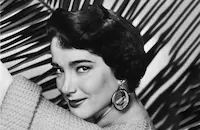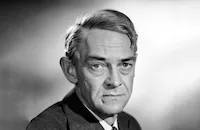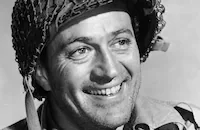The Gunfight at Dodge City
Brief Synopsis
Cast & Crew
Joseph M. Newman
Joel Mccrea
Julie Adams
John Mcintire
Nancy Gates
Richard Anderson
Film Details
Technical Specs

Synopsis
In Hays City, Kansas, buffalo hunter and gambler Bat Masterson kills cavalry sergeant Ernie King in self-defense. Although wounded, Bat takes his best friend Ben's advice and flees to Dodge City to stay with his brother, state marshal Ed Masterson. Bat arrives in town at the height of the election campaign for town sheriff and is befriended and tended to by the town doctor, Sam Tremain. After introducing Bat to his fiancée Pauline and her father, Rev. Howard, Ed explains that the current sheriff, Jim Regan, is a former gunman, as are his cronies. Constricted by the legal boundaries of marshaling, Ed reveals his determination to run against Regan in order to clean up the lawlessness that has taken over the town. Bat remains indifferent to Ed's ambitions, but startles his brother and the Howards with his announcement that he will remain in Dodge City and purchase a saloon. Soon after, Bat visits the Lady Gay saloon, where Sam presents him to the proprietor, Lily, a widow whose husband was murdered for refusing to pay Regan protection money. Lily admits that she is near bankruptcy since Regan forced the departure of her dealers, but she stubbornly refuses to close. Bat offers to invest six thousand dollars in the Lady Gay for a half interest and, although stunned, Lily quickly agrees. Upon seeing the renovations being made to the Lady Gay, Regan approaches Bat to make an offer for the saloon, then threatens the gambler when he refuses. Unknown to Bat, acquaintance and fellow gambler Dave Rudabaugh has followed him to Dodge City, bitter over the death of King, his cousin. After the successful opening night of the reinvigorated Lady Gay, Bat, Lily, Sam and Ed close up, unaware that Dave and, separately, two of Regan's henchmen, are stalking Bat. As Dodge City erupts into the usual Saturday night drunken rowdiness, Dave shoots Ed in the back under the cover of the revelry. Regan's henchmen then burst in and are killed by Bat, who believes they shot Ed. After Ed's funeral the next day, Dave pretends to have just arrived and accepts Bat's offer to work as a dealer at the Lady Gay. Pauline visits Bat to recover some of Ed's personal effects and accuses him of bringing about Ed's murder. Bat admits his brother was an exceptional man, but challenges Pauline over the depth of her feelings for him. Upon discovering that Regan has left town, Bat searches the Kansas countryside for him in vain, then, knowing Regan must return to Dodge City for election day, goes back to Dodge after visiting Ben in Hays City. Lily tells Bat that Regan has indeed come back to town, but warns him not to kill him as he is still the sheriff. Howard then calls on Bat to tell him that the town committee wants him to take Ed's place as their candidate for sheriff. Bat scoffs at the notion, but Howard insists that Bat stood up to Regan's initial challenge over the saloon and, despite being a known gambler and gunslinger, is preferred over Regan. Bat restates his determination to avenge Ed's death, but when Regan arrives unannounced, Bat begins a fistfight with him and afterward abruptly agrees to run for sheriff. With the support of the committee and law-abiding citizens, Bat is elected sheriff and declares that although he will allow gambling and saloons to remain in business, they will be restricted to set hours. When Pauline expresses skepticism over Bat's abrupt embrace of the law, Bat reminds her that he is Ed's brother. Regan and his men attempt to stir the town up for its usual Saturday night revelry, but Bat quells their antics. Bat then begins spending time with Pauline, but when he suggests they date, she demurs, admitting she could never be involved with a saloon owner. Bat promptly goes to Lily to give up his half interest in the Lady Gay and Lily sadly realizes Bat's involvement with Pauline. Back in his rooms, Bat receives a visit from Ben who is alarmed because his younger, simple-minded brother Billy has inadvertently shot and killed a Hays City deputy. Although Bat agrees that Billy ought to have been institutionalized long ago, he refuses Ben's plea to help him break his brother out. Meanwhile, Dave sneaks into Lily's room and declares his attraction to her. When she threatens to cry out, Dave goads her into calling for Bat, revealing he murdered Ed and intends to kill Bat for the death of his cousin. Drawn by Lily's screams, Ben and Bat rush to her room, and after Dave wounds Ben, Bat kills the gunman. With Ben unable to help Billy, Bat reluctantly agrees to intercept the stagecoach transferring the boy to the prison where he is to be executed. Sam joins Bat and the men easily get Billy away from the stage during a rest stop. Ben meets them at a prearranged location where Sam provides a medical statement that will allow Billy admittance and protection in a state hospital. Ben then reveals that despite his efforts, the citizens of Dodge City learned of Bat's actions and have voted to strip him of his badge. Bat returns to town where a special election is called. Howard expresses dismay that Bat has broken his oath and Bat is surprised at the depth of his own disappointment. When Bat goes to Pauline to tell her he plans to turn himself in, she remains disdainful and aloof. Realizing his attraction to her has been only superficial, Bat departs and goes in search of Sam at the Lady Gay. Lily welcomes Bat back with enthusiasm, which is cut short when Regan summons Bat into the street for a show-down. Despite Sam and Lily's warnings, Bat meets Regan and offers to wage their battle at the election box, but Regan refuses. Regan draws, but Bat kills him. Declaring that the "election" has been decided, the town committee agrees that Bat remain sheriff and he returns to Lily, Sam and the Lady Gay.

Director

Joseph M. Newman
Cast

Joel Mccrea

Julie Adams

John Mcintire

Nancy Gates

Richard Anderson

James Westerfield
Walter Coy

Don Haggerty
Wright King
Harry Lauter
Myron Healy
Mauritz Hugo
Henry Kulky
Crew
Ralph Butler
Kathleen Fagan
Martin M. Goldsmith
Carl Guthrie
Richard V. Heermance
Bert Henrikson
Austen Jewell
Serge Krizman
Emile Lavigne
Walter M. Mirisch
Alice Monte
Ted Mossman
Eve Newman
Robert A. Reich
Milt Rice
Hans J. Salter
Herman Selgrath
Daniel B. Ullman
Daniel B. Ullman
Allen K. Wood

Film Details
Technical Specs

Articles
The Gunfight at Dodge City
The film takes place in a notorious rough 'n' tumble town which needs somebody like Bat Masterson (Joel McCrea) to bring some semblance of order to the place. Masterson is pressured to take the job of sheriff and reluctantly agrees despite sure signs of trouble from the start. For one thing, he's distracted from the job at hand by two local lovelies, Pauline (Julie Adams) and Lily (Nancy Gates). If that wasn't enough Mr. Bat has to deal with both his old wrong-side-of-the-law gang and a passel of corrupt politicians. Yep, there's a gunfight, too.
The Gunfight at Dodge City succeeds for several reasons but the major one is the top notch cast. Joel McCrea was a veteran whose career began with the sound era in 1927 (he started appearing in small roles, even dancing with Greta Garbo in one early film - The Single Standard, 1929). Despite being very busy, McCrea's career didn't take off until the 1940s when he appeared in films by Alfred Hitchcock and Preston Sturges alongside Western classics like Ramrod (1947) and The Virginian (1946). It was his work in the latter genre, though, that dominated his career and his iconic screen presence was just what director Sam Peckinpah wanted for Ride the High Country.
Julia (also Julie) Adams was one of the 50s' more memorable B-level actresses. Her career started in low-budget Westerns in 1950 where she stayed for most of the decade though she's probably best remembered for The Creature from the Black Lagoon (1954). Adams later worked extensively in television and was a regular on Murder She Wrote and Capitol. Adding his offbeat charm is accomplished character actor John McIntire who played some of the most believable villains on the screen, including his role in (The Far Country, 1955).
Producer: Walter Mirisch
Director: Joseph M. Newman
Screenplay: Martin G. Goldsmith, Dan Ullman
Art Direction: Serge Krizman
Cinematography: Carl Guthrie
Editing: Victor Heerman
Music: Hans Salter
Cast: Joel McCrea (Bat Masterson), Julie Adams (Pauline), John McIntire (Doc), Nancy Gates (Lily), Richard Anderson (Dave), James Westerfield (Rev. Howard), Timothy Carey (Forbes), Don Haggerty (Sheriff Regan).
C-81m. Letterboxed.
By Lang Thompson

The Gunfight at Dodge City
Quotes
Trivia
Notes
The working title of the film was The Bat Masterson Story. Canadian-born William Barclay "Bat" Masterson (1853-1921) was a buffalo hunter and Indian scout in Dodge City, Kansas while also intermittently serving as the Ford County sheriff (from 1877-79) and a deputy U.S. marshal (1879). He made his living mostly as a saloonkeeper and gambler. His brothers, Ed and James Masterson, were also Dodge City lawmen. For more information on Masterson, please consult the entry for the 1943 United Artists production The Woman of the Town, starring Claire Trevor and Albert Dekker, directed by George Archainbaud (see AFI Catalog of Feature Films, 1941-50). Masterson was a featured character in many other Western movies, including the 1947 RKO film Trail Street, starring Randolph Scott and Robert Ryan, directed by Ray Enright (see AFI Catalog of Feature Films, 1941-50 ); Columbia's 1955 film Masterson of Kansas, starring George Montgomery and Nancy Gates, directed by William Castle (see below); Paramount's 1957 film Gunfight at the O.K. Corral, starring Burt Lancaster and Kirk Douglas, directed by John Sturges (see below); and the television series Bat Masterson,which ran from 1959 to 1961, and starred Gene Barry as the lawman.

Miscellaneous Notes
Released in United States 1959
CinemaScope
Released in United States 1959














